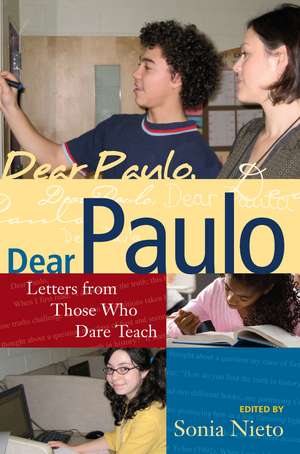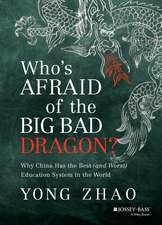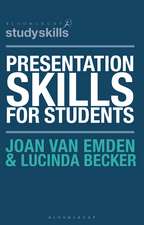Dear Paulo: Letters from Those Who Dare Teach: Series in Critical Narrative
Autor Sonia Nietoen Limba Engleză Paperback – 30 sep 2008
| Toate formatele și edițiile | Preț | Express |
|---|---|---|
| Paperback (1) | 290.15 lei 6-8 săpt. | |
| Taylor & Francis – 30 sep 2008 | 290.15 lei 6-8 săpt. | |
| Hardback (1) | 875.64 lei 6-8 săpt. | |
| Taylor & Francis – 30 iun 2008 | 875.64 lei 6-8 săpt. |
Din seria Series in Critical Narrative
-
 Preț: 362.74 lei
Preț: 362.74 lei -
 Preț: 361.06 lei
Preț: 361.06 lei -
 Preț: 298.15 lei
Preț: 298.15 lei -
 Preț: 230.77 lei
Preț: 230.77 lei -
 Preț: 386.51 lei
Preț: 386.51 lei -
 Preț: 341.16 lei
Preț: 341.16 lei -
 Preț: 346.55 lei
Preț: 346.55 lei - 18%
 Preț: 1218.08 lei
Preț: 1218.08 lei -
 Preț: 464.54 lei
Preț: 464.54 lei - 16%
 Preț: 234.90 lei
Preț: 234.90 lei - 13%
 Preț: 291.27 lei
Preț: 291.27 lei - 13%
 Preț: 288.72 lei
Preț: 288.72 lei - 13%
 Preț: 289.21 lei
Preț: 289.21 lei - 26%
 Preț: 820.10 lei
Preț: 820.10 lei -
 Preț: 345.06 lei
Preț: 345.06 lei - 26%
 Preț: 849.77 lei
Preț: 849.77 lei -
 Preț: 259.80 lei
Preț: 259.80 lei -
 Preț: 422.05 lei
Preț: 422.05 lei
Preț: 290.15 lei
Preț vechi: 340.19 lei
-15% Nou
Puncte Express: 435
Preț estimativ în valută:
55.52€ • 58.12$ • 45.94£
55.52€ • 58.12$ • 45.94£
Carte tipărită la comandă
Livrare economică 05-19 aprilie
Preluare comenzi: 021 569.72.76
Specificații
ISBN-13: 9781594515354
ISBN-10: 1594515352
Pagini: 224
Dimensiuni: 156 x 234 x 12 mm
Greutate: 0.32 kg
Ediția:1
Editura: Taylor & Francis
Colecția Routledge
Seria Series in Critical Narrative
Locul publicării:Oxford, United Kingdom
ISBN-10: 1594515352
Pagini: 224
Dimensiuni: 156 x 234 x 12 mm
Greutate: 0.32 kg
Ediția:1
Editura: Taylor & Francis
Colecția Routledge
Seria Series in Critical Narrative
Locul publicării:Oxford, United Kingdom
Recenzii
“Sonia Nieto is daring for having dreamt and realized a project that ‘not even she nor anyone else could have imagined,’ without the complicity of dozens of people… This [is a] book of rare beauty and extreme importance and a must read for all those for whom ‘reading the world’ will make them want to transform it. We should all congratulate ourselves: Paulo is smiling with us.”
—Ana Maria Araújo Freire
“In Dear Paulo: Letters from Those Who Dare Teach, dozens of teachers write deeply personal letters addressed to famed Brazilian educator Paulo Friere. The result is a book that has much of the fire and magic of Friere’s own writing.”
—Teaching Tolerance(Spring 2010)
“I am mindful of the awesome responsibility that I inherit as an educator. I take comfort knowing that I am never alone, in that we who teach comprise collectively multiple links in a chain of empowerment that stretches backward in time, but more important, forward into the unseen future. If I am to serve humbly as one small link along countless others, your ideas, Dear Paulo, are the iron through which that chain is wrought, and made ever more strong and tenacious…”
—excerpt from the letter by John Raible, a teacher educator
—Ana Maria Araújo Freire
“In Dear Paulo: Letters from Those Who Dare Teach, dozens of teachers write deeply personal letters addressed to famed Brazilian educator Paulo Friere. The result is a book that has much of the fire and magic of Friere’s own writing.”
—Teaching Tolerance(Spring 2010)
“I am mindful of the awesome responsibility that I inherit as an educator. I take comfort knowing that I am never alone, in that we who teach comprise collectively multiple links in a chain of empowerment that stretches backward in time, but more important, forward into the unseen future. If I am to serve humbly as one small link along countless others, your ideas, Dear Paulo, are the iron through which that chain is wrought, and made ever more strong and tenacious…”
—excerpt from the letter by John Raible, a teacher educator
Cuprins
Introduction; Part 1 Beginnings; Chapter 1 Reading the Class, Mary Cowhey; Chapter 2 Thirty-Nine First Days, Mary Ginley; Part 2 Fear/Courage; Chapter 3 Teaching for the First Time, Sarah Hamlett; Chapter 4 Fear of Disappointing, Angélica Ribeiro; Chapter 5 More Questions than Answers, Lynn Sisco; Chapter 6 Lessons from Paulo, Nancy Costa; Chapter 7 Fighting for Democracy, Dalia Mostafa; Chapter 8 Modeling Democratic Principles, Laila Di Silvio; Chapter 9 Easy to Say, Not to Do, Tzu-Pei Kuo; Chapter 10 Defying the Paralysis of Fear, Elizabeth Robinson; Chapter 11 Teaching for Liberation, Kathy McDonough; Part 3 Pedagogy; Chapter 12 On Being a Teacher, Daniela Alvarez-Bradley; Chapter 13 Saying Yes to Teaching, Lisa Varandani; Chapter 14 Teaching Vows, Hera Zinno; Chapter 15 The Courage to Teach, Carolina Rothkegel; Chapter 16 The Responsible Learner, Elaine Stinson; Chapter 17 A “Stealth Coup” Threatens Us, Ira Shor; Chapter 18 Can Popular Education Work in U.S. Educational Settings?, Andrée Rose Catalfamo Fee; Chapter 19 Pedagogy of Love, Carlos REC McBride; Chapter 20 Testimony to Teaching, Elizabeth Rendón; Part 4 Praxis; Chapter 21 A Good Vision, Not an Easy One, Jacqueline Pinn; Chapter 22 Teaching as Advocacy, Toni Hochstadt; Chapter 23 Questioning, Teaching, and Growing, Kerri Warfield; Chapter 24 Seeds of Solidarity Cultivating Hope with Hammers, Shovels, and Ideas, Deb Habib; Chapter 25 Context Matters, Wendy Seger; Chapter 26 Daily Acts of Praxis, Adriana Morehouse; Chapter 27 Learning Moments Raging a Bit, and with Hope, Tom Wilson; Chapter 28 The Challenges of Aligning Cultural Integrity with Social Justice, Sara L. Young; Chapter 29 Changing the World a Little Bit, Amadee Meyer; Chapter 30 Radicalizing the Reading of the World through Art, Patty Bode; Chapter 31 Chatting across Texts, Geography, and Time, Michelle Fine; Chapter 32 Questions and Quandaries from the Academic Borderlands, Jason G. Irizarry; Part 5 Conscientização; Chapter 33 Pieces of the Puzzle, Stacie Tate; Chapter 34 The Fire of Conscientization Still Burns, Ramón Vega de Jesús; Chapter 35 Lessons in Humility Understanding Teaching as Struggle and as Service, John Raible; Chapter 36 Teaching Became a Revolution, Ernest Morrell; Chapter 37 A New Way to Read the World, Diana Caballero; Chapter 38 Of Rage and Hope, Sawsan Abbadi; Chapter 39 Fostering Change and Consciousness among Students and Colleagues, Dawn Fontaine; Chapter 40 Tertulias and Problem-Posing Education, Anaida Colón-Muñíz; Part 6 Politics; Chapter 41 The Teacher-Politician, Elena Khatskevich; Chapter 42 Building Community beyond Limit-Situations, Berta Rosa Berríz; Chapter 43 Eating, Talking, and Acting: The Magic of Freire, Herb Kohl; Chapter 44 Why History? An Open Letter to My Students, Eugenie Kang; Chapter 45 A Teacher’s Thoughts on the “War on Terrorism”, Claire La Bonté; Chapter 46 What I Learned in School: A Poem about Puerto Rico, Shakira Alvarez-Ferrer; Chapter 47 Radical Politics, Writing, and the CIA, Linda Brodkey; Part 7 Love; Chapter 48 A Love Letter to Paulo, Kristen French; Chapter 49 Learning to Love My Students, Alexis Nasdor-Jones; Chapter 50 Teaching with Tenderness and Compassion, Ruth Harman; Chapter 51 Colonialism, the English Language, and a Teacher’s Love, Kelley Crisp; Chapter 52 Love as Daring, Jennifer Burk; Chapter 53 Love, in Spite of It All, Stephanie Doyle; Chapter 54 Teaching as Relationship, Mike Hayes; Chapter 55 Time to Love, Tracy Walker; Part 8 Study/Dialogue; Chapter 56 The Need to Study, Tina Clark; Chapter 57 Weekly Conversations, Martha Barquero-Checkwicz; Chapter 58 Critically Analyzing Paulo, Phil Lawrence; Chapter 59 Rereading the Text, Maria José Botelho; Chapter 60 Beyond “Getting the Reading Done”, Romina Pacheco; Chapter 61 To Study Is a Revolutionary Duty, Jeff Duncan-Andrade; Chapter 62 More than Turning Pages, Michael Greene; Part 9 Freedom; Chapter 63 Pedagogy of the Township: A Letter to Paulo Freire, Bekisizwe S. Ndimande; Chapter 64 Feathers, Theresa Jenoure; Chapter 65 Layers of Understanding, Margaret Allard; Chapter 66 We Dare: To Teach, to Learn, to Love, Andrew Habana Hafner; Chapter 67 Teaching and the Struggle for Democracy, Brahim Oulbeid; Chapter 68 New Beginnings and a Vision of Possibility, Maxine Greene
Descriere
From newly minted teachers terrified of facing their first day in the classroom to seasoned academics whose work has largely been inspired by Freire, this collection, accompanied by photographs of the author with some of the letter writers, is both a memorial and a call to action to work for social justice, praxis, and democracy.















